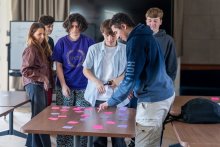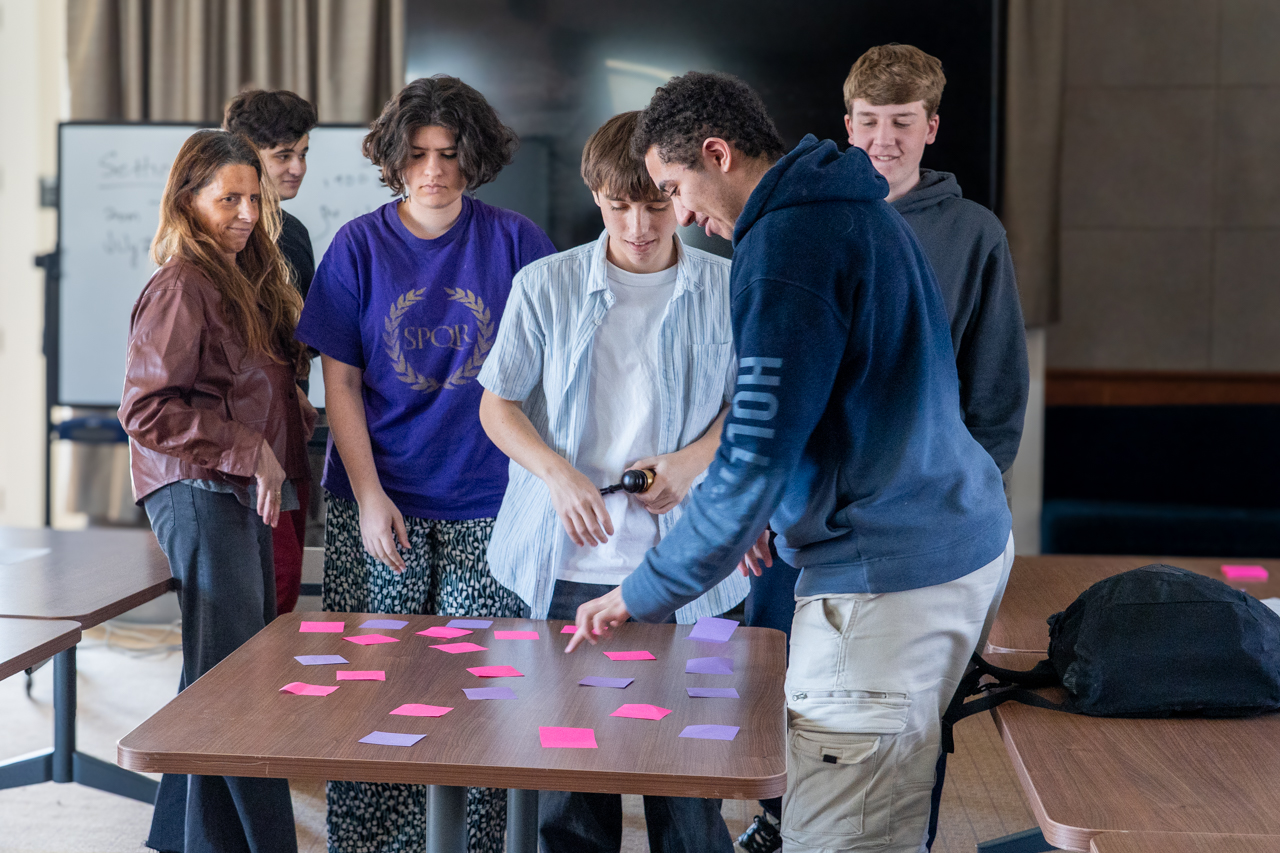
Middle School Instructional Coach and 12th Grade English Teacher Kathy Coen shares her thoughts about AI's inability to effectively imitate the essential components of the creative process as evidenced by the poetry unit she developed in her 12th grade Creative Writing Class.
“The task that generative A.I. has been most successful at is lowering our expectations, both of the things we read and of ourselves when we write anything for others to read. It is a fundamentally dehumanizing technology because it treats us as less than what we are: creators and apprehenders of meaning. It reduces the amount of intention in the world.” ~Ted Chiang, “Why A.I. Isn’t Going to Make Art,” The New Yorker
In a conversation about AI the other day, a colleague and I were wondering and worrying together about why a student would ever use AI to help them write a poem for a Creative Writing class. As an English teacher in both 7th and 12th grade who has an MFA in poetry and has taught poetry to adolescents for decades, I needed to explore this dilemma more deeply. If we attempt to answer this question head on, we might come to the conclusion that students today might assume poetry has a right or best answer, or that they don’t have time to go through the creative process, or that the creative process, the poem itself, is old fashioned and has no accompanying visuals or viral tik tok appeal.
In Ted Chiang’s recent article in New Yorker, “Why A.I. Isn’t Going to Make Art,” Chiang posits that the human endeavor to make art requires three things from a human being: making hundreds of important decisions and choices, great effort expended, and intentionality. In these conclusions, I found not only the seeds of my continued drive and commitment year after year to believe in the power of the creative process, specifically the writing of poetry to transform a student's sense of self, but our own academic mission here at Field: To give students a glimpse of what might be called their own infinite potential, or as the romantic poet John Keats might say, the opportunity that poetry and language in itself affords us,” The creative Word (that) opens and enhances the containing World."
On the first day of the poetry unit in my Senior Seminar: Creative Writing this winter, I split students into teams of 4 and asked them this: What poetry was not. They looked at me quizzically and wondered what they were supposed to do with a question like that. I told them it was a matter of subtraction that would help them find what actually delineated a poem. They wanted more instructions, but instead, I handed them five index cards and asked them to write one idea on each of them with the knowledge that they would have to present and defend them against their classmates who could debunk and vote the idea out. “May the best team win! “
What followed was one of the noisiest, most productive minutes since the start of the year that enlivened the room with debate, exclamations, and many “I’ve got it! Poetry is not…” Some of the answers were: Poetry is not science, poetry is not math, poetry is not finite, poetry is not wrong or right, poetry is not limited, poetry is not prose, poetry is not rule-bound, poetry is not grammatical, poetry is not straightforward, poetry is not definable, poetry is not literal, poetry is not general, poetry is not meant to be analyzed … and the list goes on. The debates were fierce and teams chanted “We won!” Of course, I knew they were all winners in that they were ready to be vulnerable. To make choices, try hard, and be intentional.
My method of teaching students to write in a form that might seem impossible to many and outdated to others begins with structure and a nod to the poets of the past, combined with the fresh and invigorating free verse poets of our day. In Poem Pairs: A Found Poem I gathered poems that had like-themes, such as artifacts, in John Keat’s “Ozymandias” and Robert Pinsky’s “The Want Bone.” Students' first task is to pick a pair and from the lines of both poems carve out a new poem of 8-10 lines.
Uncrushed, Unstrung
~ Fionn ‘25
A shattered visage lies, half sunk, whose frown,
And wrinkled lip, and sneer of cold command;
It is my food, my parent, my child, I want you for my own, my flower, my
life, my lightness.
Blue rippled and soaked in the fire of blue,
I met a traveller from an antique land.
And their bone tasted of nothing and smelled of nothing;
Uncrushed, unstrung, a scalded toothless harp.
Yet they survive, and stamped on these lifeless things,
The hand that mocked them, and the heart that fed.
Their second exercise was to be able to imitate voice while beginning to establish their own – maybe not even noticing how hard that task is and the choices they needed to make each step of the way. Using Derek Walcott’s “Love after Love,” as the bookends of the poem, they created the middle and a new title.
Reflection
The time will come
when, with elation
you will greet yourself arriving
at your own door, in your own mirror
and each will smile at the other's welcome,
at your company,
and at your food.
You'll come to appreciate the simple things.
Those things you once ignored,
not only around you,
but within yourself.
So cast off the bowlines.
Set yourself free.
Peel your own image from the mirror.
Sit. Feast on your life.
Derek Walcott and Ben '25
1930-2024
As students gained more confidence, they were set free within the limits of the painting or sculpture they chose to write about during our visit to the Kreeger Museum. Students had time to view the collection in and out of doors and let something speak to them, so much so that they could “hear” the voice of that piece. The persona poem is freeing and certainly infinite, while the artwork is contained, perhaps framed; the voice was theirs to discover. This was by far the student's favorite assignment, The Kreeger Museum: Persona Poem, and perhaps not only because of the choice, but because of the intentionality of this process. They could only write after viewing the piece for five minutes without breaking their focus. Hard work!
Mike Hagan
Gulls, 2006
Screenprint
The Gull
You:
Perch your palmated feet upon my well-trodden spine;
Perch your truffled tail amongst my mangled shoulders;
Perch upon my visage and find ease into the creases of my spine.
The:
Perch prosper in permanent contours: scuttled silhouettes-
resting in respite: glistening within the reefs that they call home
See:
Perched, you trust that I will do no wrong
Perched, you exist as a watchtower of your own
Gull:
I will perch you til’
I am old and rotting
within these seas–
I alone will give you rest
~ Kennedy ‘25
By the end of the unit, students have written six poems and read a whole collection of poetry, choosing one of six challenging texts by the most influential poets writing today. Along with this, they must write a Choice Poet Review of their chosen poet, focusing on many of the same elements they focused on as poets themselves during the unit. The last and final poetry exercise was to respond to their poet in one of three ways, Choice Response Poem, and speak directly to the poet whom they had gotten to know very well through great efforts.
Option 2: Imitation poem: To Victoria Chang Obit
Words
Died—on an ordinary morning as my eyes flashed open the bright sun reflecting off the early dew that irregularly blanketed my window every morning. No one noticed. Throughout the day my words kept spilling, like pigeons from a broken coop they had nowhere to go trapped by the walls, no open windows or sky just walls that clipped their wings. They tried to squawk from my throat but my body had already shut down.
~ Peter '25
I have never underestimated the power of what is almost ineffable, too profound for language to capture it. However, working with students for many decades has shown me that right before something is too hard to capture, it is there for them if they are willing to work exceptionally hard to make decisions that are intentional.
